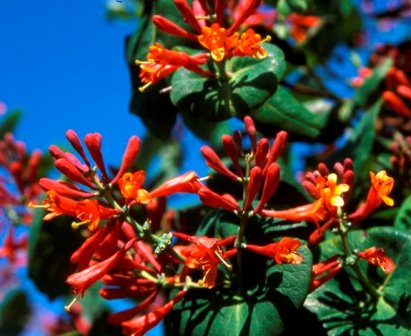The Wonders of Scarlet Honeysuckle
When it comes to gardening, there are so many beautiful and unique plants to choose from. One plant that stands out is the scarlet honeysuckle. This stunning plant is known for its bright red blooms and sweet fragrance, making it a popular choice for gardeners all over the world.
What is Scarlet Honeysuckle?
Scarlet honeysuckle, also known as Lonicera sempervirens, is a climbing vine that is native to North America. It can grow up to 20 feet tall and has trumpet-shaped flowers that bloom in late spring and early summer. The flowers are bright red and have a sweet nectar that attracts hummingbirds, bees, and butterflies.
How to Grow Scarlet Honeysuckle
Growing scarlet honeysuckle is relatively easy, and it can be in most climates. The plant prefers well-drained soil and full sun to partial shade. It is also drought-tolerant, making it an excellent choice for areas with little rainfall.
To grow scarlet honeysuckle, by planting the seeds or cuttings in the spring or fall. If you are planting seeds, soak them in water overnight before planting. You can plant them directly in the ground or in containers.
Once the plants are established, they will need occasional pruning to keep them healthy and looking their best. Prune in the late winter or early spring before new growth begins.
Tips for Growing Scarlet Honeysuckle
- Water regularly during the first year of growth
- Fertilize in the spring with a balanced fertilizer
- Prune regularly to keep the plant healthy and looking its best
- Propagate by taking cuttings in the summer
Benefits of Growing Scarlet Honeysuckle
Aside from its stunning beauty, scarlet honeysuckle has many benefits for gardeners and wildlife. Here are some of the top benefits:
Attracts Pollinators
Scarlet honeysuckle is a favorite among hummingbirds, bees, and butterflies. Its sweet nectar provides a valuable food source for these important pollinators, helping to support local ecosystems.
Low Maintenance
Scarlet honeysuckle is relatively low maintenance, making it an excellent choice for busy gardeners. It is drought-tolerant and can grow in most soils, making it a versatile plant for any garden.
Natural Pest Control
Scarlet honeysuckle is known to repel pests such as aphids and whiteflies, making it a natural pest control solution for your garden.
How to Use Scarlet Honeysuckle in Your Garden
Scarlet honeysuckle is a versatile plant that can be used in many different ways in your garden. Here are some ideas:
Trellis or Arbor
Train your scarlet honeysuckle to climb up a trellis or arbor to create a beautiful focal point in your garden.
Ground Cover
Plant scarlet honeysuckle on a slope or hilde to create a beautiful ground cover that will help prevent erosion.
Container Plant
Plant scarlet honeysuckle in a container to create a beautiful display on your patio or balcony.
Frequently Asked Questions
Q: When is the best time to plant scarlet honeysuckle?
A: The best time to plant scarlet honeysuckle is in the spring or fall.
Q: How much sun does scarlet honeysuckle need?
A: Scarlet honeysuckle prefers full sun to partial shade.
Q: How often should I water my scarlet honeysuckle?
A: Water your scarlet honeysuckle regularly during the first year of growth, and then as needed.
Q: How do I propagate scarlet honeysuckle?
A: Propagate scarlet honeysuckle by taking cuttings in the summer.
Q: What are some common pests and diseases that affect scarlet honeysuckle?
A: Some common pests and diseases that affect scarlet honeysuckle include aphids, whiteflies, powdery mildew, and leaf spot.
Scarlet honeysuckle is a beautiful and versatile plant that can be used in many different ways in your garden. Whether you want to attract pollinators, create a focal point, or prevent erosion, scarlet honeysuckle is an excellent choice for any gardener. With its stunning red blooms and sweet fragrance, it's no wonder why this plant is so popular around the world.










Post a Comment for "The Wonders of Scarlet Honeysuckle"